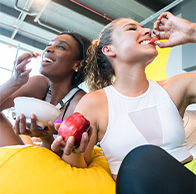It's your turn to bring snacks to your soccer star’s tournament or your little slugger's baseball game. Like most parents, your first thought may be, "What can I grab in a hurry to bring to the game this weekend?" Fortunately, being the team parent responsible for bringing healthy and nourishing snacks doesn’t have to add stress to your already hectic week.
It's never too early to show children the importance of eating snacks that provide calories and replenishment. You want to fuel-up your little athletes, not bog them down, so the snacks you choose should:
- Provide energy for working muscles to power through the activity (pre-exercise)
- Supply fluids for hydration and to maintain the body’s temperature (before, during and after exercise)
- Provide nutrients for growth and development
- Promote recovery after hard exercise
Furthermore, snacks should be easily digestible so blood can flow to the muscles that are working during the activity and not to the gut to digest a heavy, fatty snack. Here are some additional tips to help you provide healthy and age-appropriate snacks:
- Consider portion sizes. Children do not need “grown-up” amounts of snacks.
- Read labels. There is nothing wrong with bringing ready-to-go processed foods for your child’s games; however, read the labels to ensure that the recommended amount of calories, carbohydrate, protein, fat and fiber are met.
- There may be children on your kid’s team who have nutrition restrictions such as nut allergies, lactose intolerance and/or gluten-free requirements. Ask to see if this is an issue. If so, provide alternatives.
Here are 25 fun and healthy snack ideas for game day:
Dairy (protein and carbohydrates):
- 6-ounce cartons of low-fat or fat-free fruited yogurt or yogurt in the tube (can be frozen the night before)
- Low-fat string cheese and mini pretzels or grapes
- Small cartons of low-fat milk and baggies filled with Cheerios, cornflakes, raisin bran, muesli, etc.
- Fruit and cheese kebabs with reduced-fat Colby-Jack cheese, grapes and strawberries
Fruits and Vegetables (calories and hydration):
- Orange wedges
- Frozen grapes
- Mini apples
- Small bananas
- Strawberries with the tops cut off
- Clementines (tangerines)
- Watermelon cut into wedges or sticks
- Fruit kebabs with grapes, melons and strawberries
- Paper cups of berries
- Baggies of celery and carrot sticks
- Small boxes of raisins (Note: Dried fruit does not hydrate.)
- Unsweetened applesauce in pouches or cups
Nuts and Grains (fiber and protein)
- Whole-grain granola bars (made with real ingredients such as whole grains, nuts, seeds and/or dried fruit, have six grams or less of sugar, have between two and eight grams of fiber, and have no more than 95 milligrams of sodium per bar)
- Air-popped popcorn sprayed with olive oil spray and sprinkled with Parmesan cheese in baggies
- Homemade trail mix of raisins, almonds, granola, and other nuts and dried fruit in baggies
Hydration station:
- 100% fruit juice boxes (4 ounces)
- Bottles of cold water or thermos of ice water with slices of lemon (or oranges, limes, cucumbers, etc.)
Easy snack recipes to try:
- Healthy No-bake Granola Bites
- Ants on a log: Celery topped with creamy peanut butter and raisins or washed and quartered grapes
- Whole-grain Oatmeal Raisin Bars
- Homemade Fruit Leather Homemade Fruit Leather
It's important to take an opportunity to teach our children, and remind ourselves, of the importance of good nutrition and lots of physical activity starting early in life.
Learn how to help kids stay active with am ACE Youth Fitness Specialist Program.




 by
by 




 by
by